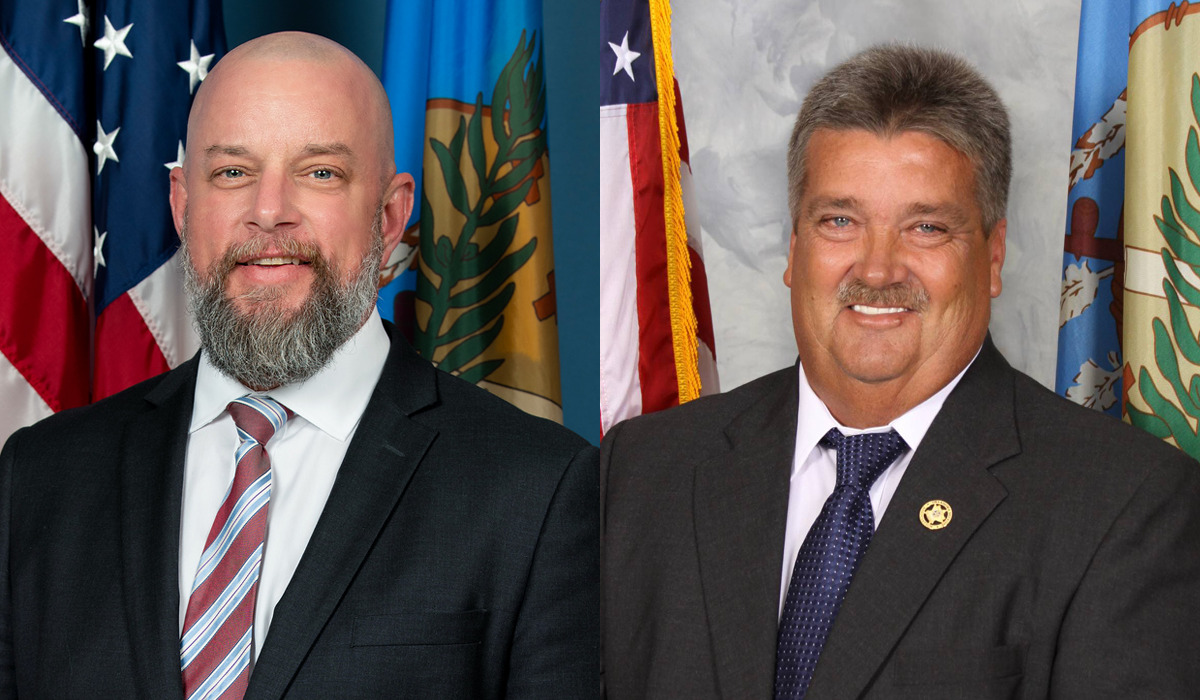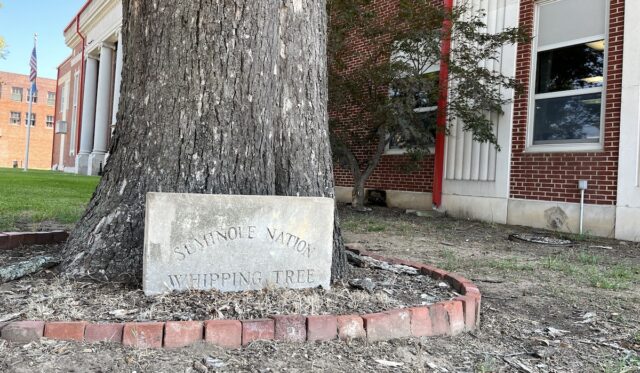

Keeping tabs on all the investigations, developments and unusual legal scenarios in Oklahoma can be a tall task.
The following roundup chronicles a few stories worth watching in Oklahoma, including criminal cases, state agency machinations and leadership changes in the public sector.
Without further ado, strap in and prepare for headlines you may have seen before but context we hope you find helpful.
Seminole County audit shows missing money from sheriff’s office

On Feb. 27, State Auditor and Inspector Cindy Byrd released a forensic audit examining the Seminole County Sheriff’s Office. The findings included more than $200,000 of missing money and come about six months after Shannon Smith resigned as sheriff as part of a deferred prosecution agreement with the Attorney General’s Office.
Byrd said an office manager, Megan Burgess, appeared to be responsible for $187,340 going missing from a kiosk where friends and family of Seminole County Jail inmates could deposit cash for use in the jail’s commissary.
“This was a complete waste of money which the taxpayers will never get back,” Byrd said in a press release, noting that Burgess had been removed from office but that the unaccounted for funds had not been recovered.
RELATED
As DA seeks Hughes County Jail alternative, Seminole County Sheriff Shannon Smith resigns by Tres Savage
Additionally, auditors said they found significant issues with a nonprofit called the Seminole County Deputy Fund, which then-Seminole County Sheriff Shannon Smith allowed to be run out of his office during business hours.
“Of the $95,870 collected by the nonprofit during this period, $88,867 worth of expenditures had no supporting documentation,” Byrd said. “The minimal documentation we found was for purchases from Walmart that included $400 in gift cards, a 55-inch TV with a three-year protection plan, a Roku TV, a sound bar, a laptop computer, an ice chest, and fishing tackle.”
Byrd said her office had turned all of the findings over to Attorney General Gentner Drummond. Federal prosecutors will handle the investigation and charging decisions regarding Burgess because she is a citizen of the Seminole Nation.
“Problems often arise when sheriffs create financial vehicles to collect money outside of their official duties,” Byrd said. “Our audits have reported weaknesses in the Seminole County Sheriff’s Office each year over the past 12 years. Inexplicably, the former sheriff never took any corrective action.”
Smith resigned Aug. 21. Under the deferred prosecution agreement, he is scheduled to pay $2,566 in restitution and have his law enforcement credentials suspended for two years.
Sod farmers plead guilty to rigging bids on ODOT subcontracts
On Feb. 27, U.S. Attorney for the Western District of Oklahoma Robert Troester announced that four erosion control company leaders pleaded guilty “to rigging bids and fixing prices as part of a conspiracy targeting a total of over $100 million in publicly funded transportation construction contracts across Oklahoma.”
Originally charged with counts of conspiracy to restrain trade related to a scheme dating back as far as 2017, the four men identified in Troester’s press release are:
- Stanley Mark Smith, who pleaded guilty Feb. 27 as co-owner of Verdigris Valley Sod Farms for allegedly targeting more than $42 million worth of contracts;
- Roy Henry Heinrich, who pleaded guilty Dec. 4 for allegedly targeting more than $7 million worth of contracts as a vice president of El Reno Sod Farms;
- Ryan Ashley Sullivan, who pleaded guilty Nov. 26 for his actions as an owner and executive of Green Turf Sod in Lawton; and
- James Travis Feazel, who pleaded guilty Sept. 26 as a former operations manager of Sioux Erosion Control.
According to criminal information documents filed against Feazel and Heinrich, prosecutors alleged that the conspirators:
- engaged in discussions and attended meetings concerning projects for, and prices of, erosion control products and services, including solid slab sodding, in the Western District of Oklahoma and elsewhere;
- agreed during those discussions and meetings to allocate bids for erosion control contracts based on geographic delineations within the state of Oklahoma, as well as other criteria discussed in advance of bid “letting” dates, or bid submission deadlines;
- agreed during those discussions and meetings not to compete for erosion control contracts by either submitting intentionally high-priced bids for jobs allocated to a different company or by declining to submit bids for such jobs altogether;
- agreed during those discussions and meetings to raise and maintain prices for solid slab sodding and other line items in erosion control contracts;
- discussed and exchanged prices submitted to prime contractors for erosion control contracts so as not to undercut one another’s prices;
- provided erosion control products and services in the Western District of Oklahoma and elsewhere through erosion control contracts awarded at collusive and noncompetitive prices;
- accepted payment for erosion control products and services provided under contracts awarded at collusive and noncompetitive prices; and h. took steps to conceal co-conspirator communications in furtherance of the conspiracy.
“Protecting fair and open marketplace competition is essential to protect taxpayers and to ensure consumers can trust publicly funded contracts,” Troester said in a press release. “Corporate executives who conspire to rig bids and fix prices will be held accountable. I applaud the detailed work by the investigators and prosecutors in this case.”
The four men have yet to be sentenced. They face up to 10 years in prison and up to a $1 million fine, or up to twice the amount gained from the conspiracy or twice the amount lost by the victims, according to Troester’s press release.
On many highway projects, sod and other products are installed by contractors as erosion control measures. All four men and their companies have been members of the Association of Oklahoma General Contractors. Asked about the plea agreements, AOGC executive director Bobby Stem issued a statement.
“The AOGC is very troubled by the actions taken by these gentlemen,” Stem said. “Our association is guided by motto ‘skill-responsibility-integrity,’ and we take these words very seriously. We hope this serves as a reminder to everyone that the best way is the honest way.”
Gov. Kevin Stitt said Friday he was unfamiliar with the federal case, but he reiterated prior talking points: “Follow the money” and “prosecute” those who do wrong among the state’s thousands of vendors.
“If these guys did something wrong, then they should be prosecuted,” Stitt said. “And then let’s do an internal audit investigation to make sure that there was nobody on our side who was doing something wrong. That’s pretty simple.”
ODVA seeks sale of vacant Talihina home, tribes assert claim
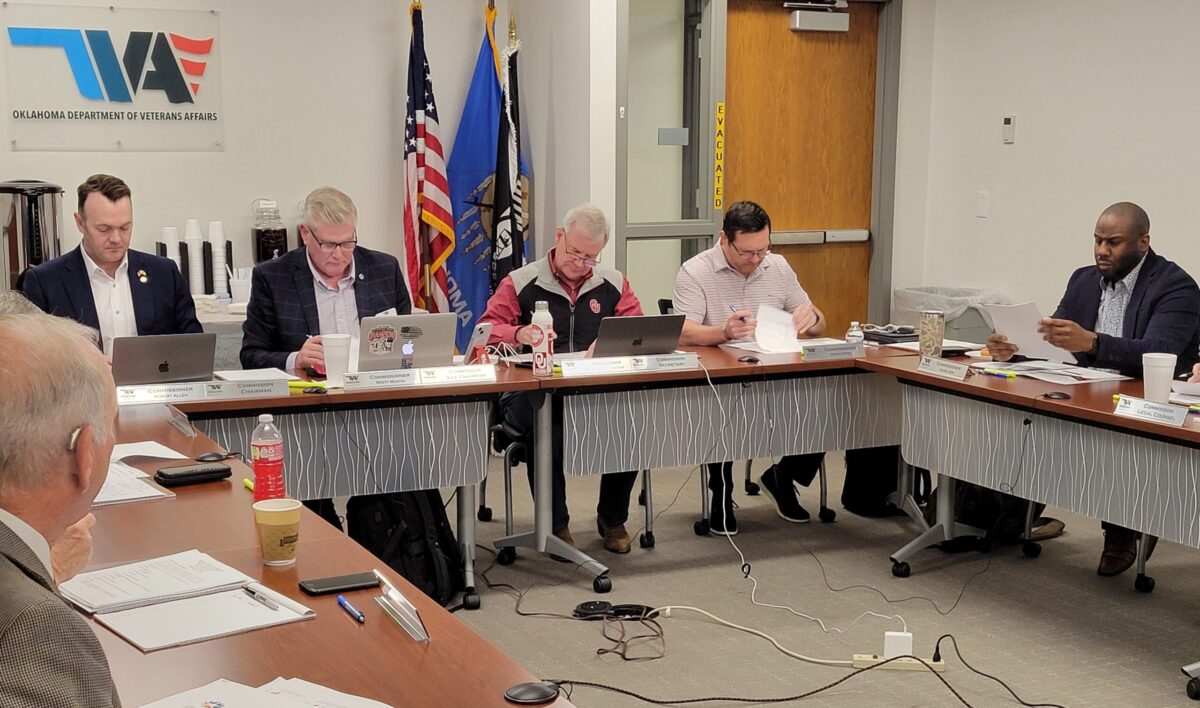
Members of the Oklahoma Veterans Commission on Friday authorized Greg Slavonic, executive director of the Oklahoma Department of Veterans Affairs, to proceed with efforts to sell the former Talihina Veterans Home amidst claims by the Choctaw Nation and Chickasaw Nation that the property should be returned to tribal ownership.
In March 2022, both tribes filed a reversionary clause on the title of the property in Latimer County, arguing that in 1921 Congress required (Page 290) the tribe to provide land in Talihina to the state of Oklahoma for medical purposes. According to the claim articulated by the tribes, provisions in the arrangement stipulate that the property reverts back to the tribes if the state stopped using it for health care needs.
“The quiet title, it’s my understanding, was put on there by the Choctaw tribe, and they refer to it as a reversionary clause added to the title so that the land would actually go back to the tribes if the state were ever to close the facility down and not use it for what it was intended to, which was a veterans home,” Slavonic said. “So that basically kind of put a hold, so to speak, on that title and really kind of made it more difficult to sell that property until the reversionary clause was resolved on that title.”
Randy Sachs, a spokesman for the Choctaw Nation, said the tribe had no comment on the Talihina property at this time.
Commissioners, who discussed that issue and other topics during a 90-minute executive session, voted in June to close the Talihina veterans home, which was built in 1921. A new veterans home being built in Sallisaw is scheduled to be open early next year.
Slavonic said the former Talihina Veterans Center has attracted one potential buyer, but the offer for the property was below the $5.6 million value appraised for the property about four years ago. Before seeking other bids, the property’s reversionary clause and the tribes’ claim have to be resolved, he said.
“This may be a legal issue that will have to go to the court system and have somebody make a judgment on what the definition of that clause is and how it affects the sale of that building.” Slavonic said. “And again, we’re just trying to work through this with our legal team and their legal team, and we’re ready to move forward and make a decision.”
Slavonic said he hoped to achieve “a win-win for both” the state and tribes.
The cost of utilities and staff to maintain the now-closed Talihina property is about $27,000 a month, Slavonic told commissioners.
Before the facility closed, ODVA was losing $500,000 a month at Talihina owing to low occupancy and high contract employee costs. The Talihina Veterans Home at one time had an occupancy rate of 175 veterans. Fewer than 30 lived there during the last six months it had been open.
Lawmakers granted the agency’s last-minute request in May for an $11.6 million appropriation increase to cover anticipated operating losses. Lawmakers also approved about $22 million in one-time funding for the Sallisaw construction project, which had been delayed more than a year by complications with an architect and subsequent cost overruns. In 2018, the agency and its governing commission initially agreed to close the Talihina Veterans Home only after the new Sallisaw center was completed, as specified in the 2018 law. But a special study last year showed that maintaining the Talihina Veterans Home would require ODVA to ask legislators to appropriate $9 million over the next 18 months.
Slavonic told commissioners that SB 1707 had won committee approval this session and is awaiting action in the full Senate. If it becomes law, SB 1707 would authorize the proceeds from ODVA’s sale of the Talihina home to help cover $4.1 million in expected start-up costs at the Sallisaw home.
Sen. Brenda Stanley (R-Midwest City) attended Friday’s meeting and told commissioners that Gov. Kevin Stitt is expected to sign SB 1215 next week. That measure, which passed 48-0 in the Senate and 79-0 in the House, removes the July 1, 2023, deadline for any 100 percent permanently disabled veterans or their surviving spouses to be eligible for their annual sales tax exemption card. Some veterans and/or their spouses had been denied new exemption cards last year when they missed the registration deadline, Stanley said.
Supreme Court approves signature gathering for SQ 832
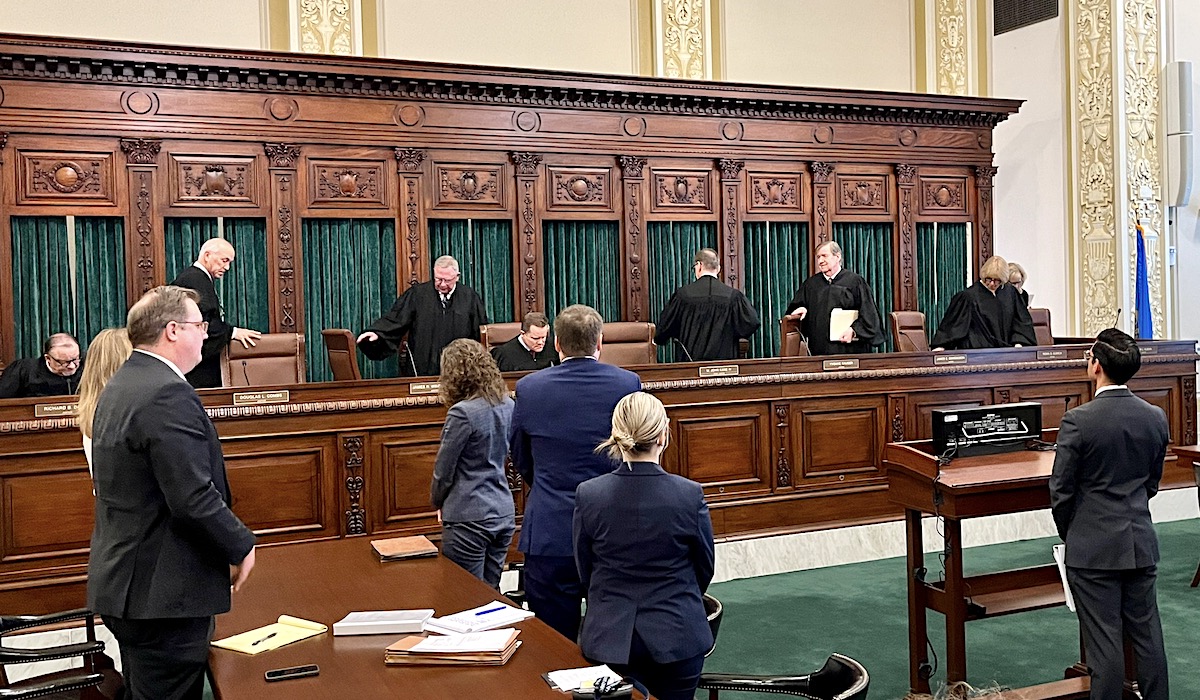
The Oklahoma Supreme Court found State Question 832 “is legally sufficient” in an order released Monday. If it makes a ballot and is approved by voters, SQ 832 would increase Oklahoma’s minimum wage to $15 from $7.25 an hour by the year 2029 and set the minimum wage to rise automatically with inflation starting in 2030. The initiative petition now moves on to the signature-gathering phase of Oklahoma’s initiative process.
The proposed state question faced a legal challenge earlier this year from Attorney General Gentner Drummond, the State Chamber and the Oklahoma Farm Bureau. Oral arguments were held on Jan. 31. Now that the court has ruled the initiative petition can continue, Oklahoma Secretary of State Josh Cockroft has 15 to 30 days to set the date for signature collection to begin.
Signature collectors will have 90 days to gather 92,263 signatures, or 8 percent of voter turnout from the November 2022 gubernatorial election. Once signatures are collected, they are turned in to the secretary of state for counting. If enough signatures are collected, the process continues with opponents having another chance to object in front of the Oklahoma Supreme Court once the official ballot wording is released.
The election date for any successful initiative petition is set by the governor, meaning Gov. Kevin Stitt will ultimately decide when to hold the election if the petition is successful.
Bills to expand State Board of Education advance
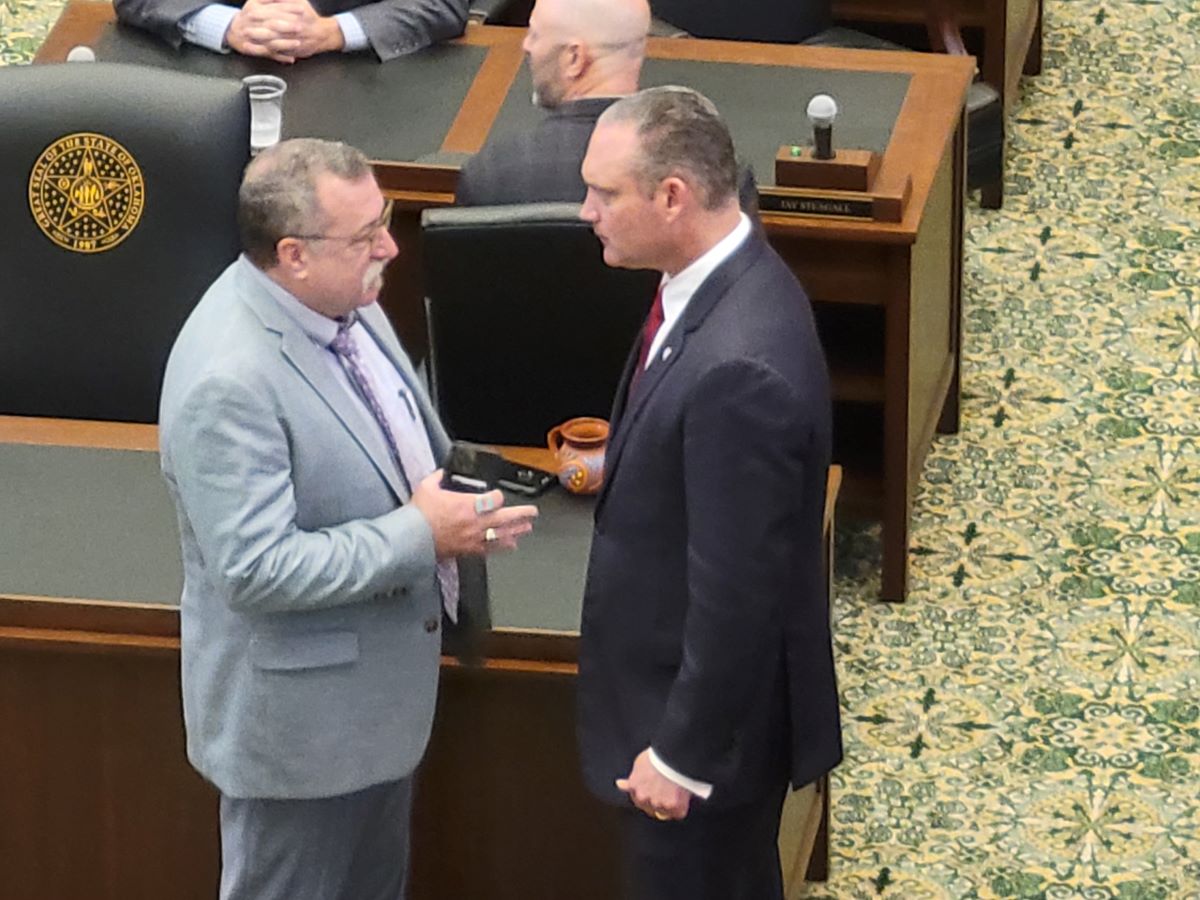
Numerous bills involving the State Board of Education advanced last week in the House and Senate.
On the House side, Rep. Mark McBride’s HB 2562 passed the House on Feb. 28 by a 60-29 vote. If it becomes law, it would add four seats to the State Board of Education, with two appointments coming from the Senate president pro tempore and two from the House speaker.
It would require the Senate president pro tempore to appoint one person from a rural community and one former school superintendent from a district with more than 10,000 students. The House speaker would also have to appoint a person from a rural community and a former superintendent from a district of less than 10,000 students.
The bill by McBride (R-Moore) will now head to the Senate, where a slightly different bill advanced out of committee Feb. 27.
Senate Education Committee Chairman Adam Pugh’s SB 1395 would also add four seats to the State Board of Education, with two appointments each from the Senate president pro tempore and the House speaker. But Pugh’s bill does not specify the type of person each chamber leader would have to appoint.
Additionally, the bill by Pugh (R-Edmond) would remove the clause stating that appointees serve “at the pleasure of the governor,” instead only allowing people to be removed from the board before the end of their term for specific reasons:
- If they are convicted of a felony or other offense “involving moral turpitude;”
- If they are found guilty of malfeasance, misfeasance or nonfeasance relating to their board duties;
- If they are found to be mentally incompetent; or
- If they miss three consecutive board meetings without showing just cause.
Currently, all five State Board of Education members are appointed by the governor and “serve at the pleasure of the governor,” meaning they can be removed from their positions at any time.
Gatz retains salary as ODOT director, needs Senate confirmation
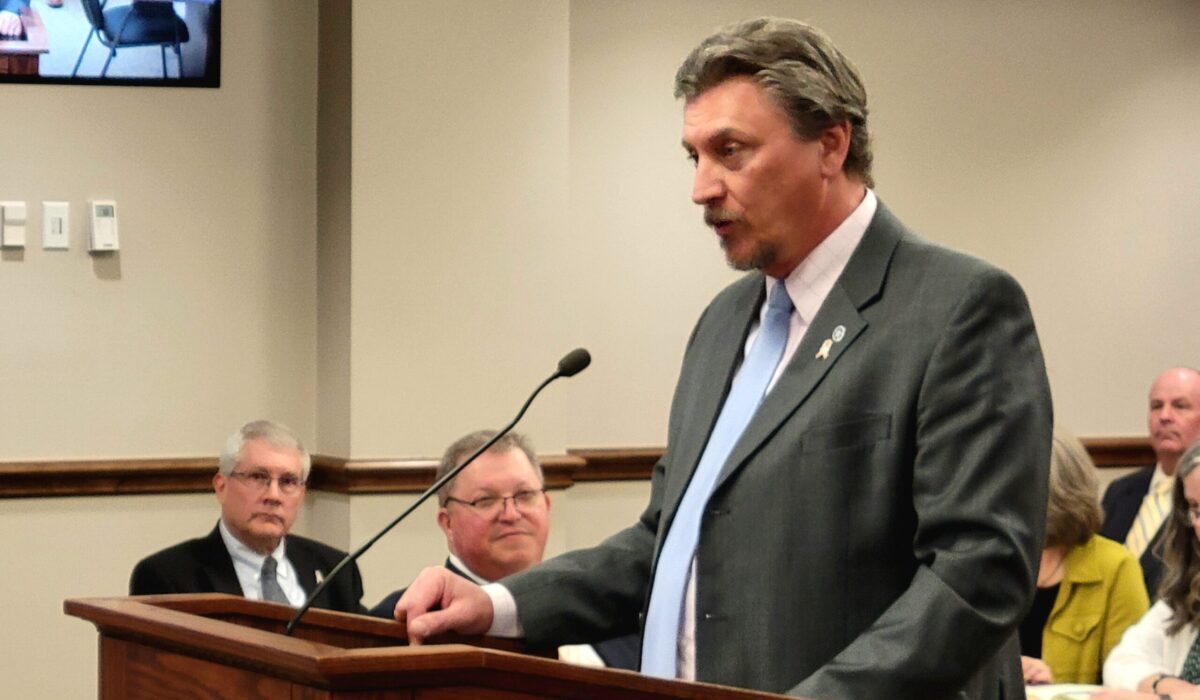
Oklahoma Department of Transportation executive director Tim Gatz told members of the Transportation Commission on Monday that he will have to be confirmed again by the State Senate as a result of last week’s opinion from the Attorney General’s Office that said he could not also serve as executive director of the Oklahoma Turnpike Authority and as secretary of transportation in the governor’s Cabinet.
“The directorship is subject to confirmation through the Senate, so again, that’s pending,” he said.
Attorney General Gentner Drummond contacted him before the opinion was released so he could act accordingly, Gatz said. He resigned immediately as OTA executive director and from Gov. Kevin Stitt’s Cabinet, and the governor reappointed him to head up ODOT.
“At no time was the continuity of operations within the agency at risk, and certainly we want to recognize that,” Gatz said. “The agency operations were at no time at risk, and we are looking forward to moving ahead and continuing the good progress of the Department of Transportation.”
Commissioners had no questions for Gatz.
After the meeting, Gatz said he would retain his existing salary that he previously received from ODOT and OTA. Transportation commissioners in January approved a 30 percent raise for Gatz, setting his salary at $245,000. The last prior pay increase for Gatz, who has worked 34 years for ODOT, had been in 2019. Before last week’s opinion, both agencies paid half his salary, while his Cabinet position was unpaid.
Gatz said his salary increase was part of a market study plan that updated his pay as director of ODOT as well as recommending raises for his approximately 2,300 ODOT employees.
“They also reached out to some of the regional DOTs and compiled all that information, (…) and I’m certainly within that range,” he said.
Raises for ODOT employees ranged from 3 to 14 percent. They also took effect in January.
Asked if he was surprised by Drummond’s opinion, considering it was common during the past 30 years for a governor to task a transportation secretary with also serving as head of ODOT or OTA or both, Gatz leaned on his experience.
“I’ve been around long enough in government to know that, you know, you just have to go with what is going on,” Gatz said. “The most important thing to me personally is the agencies continue to go forward. And, again, I think that’ll happen. And we won’t miss a beat.”
On Friday, Stitt told reporters that deputy director Joe Echelle would assume leadership of the Turnpike Authority.
On Tuesday, after meeting for nearly two hours in executive session, the OTA Board indeed appointed Echelle as the agency’s new director. Board members voted 5-0 to promote Echelle and give him a 20 percent salary increase, raising his annual pay from $200,000 to $240,000 a year.
Echelle started with the Turnpike Authority in 2016 as the director of construction, became chief engineer in 2018, and was named deputy director in 2021.
“There are lots of benefits to having the same person manage and align the two agencies,” Echelle said after the meeting. “At the same time, it is a full plate. ODOT has a tremendous responsibility in the state. This will allow Secretary Gatz, now Director Gatz, to be a little bit more involved on the ODOT side of things, and it will allow me to be a little bit more involved with the Turnpike (Authority).”
Stitt fills pair of district attorney openings
Gov. Kevin Stitt recently appointed two new district attorneys. In District 4, Tommy Humphries was appointed to fill Mike Fields’ seat representing Canadian, Garfield, Kingfisher, Blaine and Grant counties. In District 3, Dan Jacobsma was appointed to fill David Thomas’ seat representing Greer, Harmon, Jackson, Kiowa and Tillman counties.
The decisions bring Stitt’s total number of district attorney appointments to nine. While district attorneys are elected by voters, an Oklahoma statute last updated in 1987 does not allow for special elections when vacancies occur and instead specifies that the governor “shall appoint a qualified person to serve the balance of the unexpired term of said office.” District attorney appointments do not require Senate approval.
Other district attorneys appointed by the governor are Carol Iski (District 25) and Tim Webster (District 19) in 2020; Kyle Cabelka (District 5), George “Buddy” Leach (District 1) and Larry Edwards (District 15) in 2021; Adam Panter (District 23) in 2022; and Melissa Handke (District 20) in 2023.
The recent trend of sitting district attorneys leaving before finishing their term has often resulted in experienced assistants being appointed by the governor. Functionally, that allows for appointed district attorneys to establish themselves in the office and potentially benefit from the incumbency effect when they experience their first election campaign.
While the law currently ensures there are minimal vacancies in district attorney offices — which allows for prosecutions in district court to continue unimpeded — it limits the opportunity for voters to select their own district attorneys in open races.
Cherokee Nation Rules Committee reviews tribal compact, negotiations
Cherokee Nation Attorney General Chad Harsha answered questions from the Council of the Cherokee Nation’s Rules Committee on Feb. 29 relating to revisions in the tribal-state tobacco compact and ongoing negotiations over a motor vehicle compact. Under Cherokee law, the compacts require the council’s approval before taking effect.
District 12 Councilwoman Dora Patzkowski asked whether the Oklahoma Native American Liaison, former Cherokee Nation Councilman Wes Nofire, had any involvement in the tobacco compact negotiations. Harsha responded that he did not.
Nofire did not run for reelection to his council seat in 2023 and instead placed third in the race for principal chief of the Cherokee Nation. A controversial critic of tribal leaders, Nofire later was appointed by Gov. Kevin Stitt to serve as his Native American liaison.
Nofire’s rhetoric has not been popular amongst his former colleagues, with Candessa Teehee calling his statements in opposition to the McGirt v. Oklahoma decision “clearly treasonous” in 2022. Council Speaker Mike Shambaugh compared him to General George Custer’s scouts in a Cherokee Phoenix op-ed in 2023.
District 2 Councilwoman Candessa Teehee asked about “misinformation” surrounding the tobacco compact that suggested it would “erode Cherokee tribal sovereignty.”
Harsha said the claim that the compact eroded sovereignty was “an inaccurate statement.”
“This compact expressly preserves all rights with respect to the state and with respect to the Cherokee Nation,” Harsha said. “What this compact does do is continue to exercise the authority over the areas we always have.”
After Harsha was questioned on the tobacco compact — which mirrors a revised compact signed earlier this year between the state and the Chickasaw Nation — Shambaugh asked for an update on negotiations over the renewal of the motor vehicle compact. During his answer, Harsha offered rare praise of the governor’s office from a tribal official. His remarks appeared to reference Stitt’s general counsel, Trevor Pemberton.
“It has been my experience that the negotiator on the behalf of the state has been a sincere person. I think we see that reflected in the fact that we were able to reach an agreement that makes sense,” Harsha said. “I am hopeful that those conversations will be fruitful and intend to take that matter up in earnest.”
OKCPD Chief Wade Gourley saying goodbye
Oklahoma City Police Chief Wade Gourley will retire as soon as his replacement is selected, the City of OKC announced in a press release March 1.
Gourley has served as chief since 2019 when he was promoted to the position by city manager Craig Freeman. Gourley is a veteran of the department, joining in 1989. He was named deputy chief in 2017.
“Working alongside the dedicated men and women of this police department and serving this great community for over 34 years has been an incredible honor,” Gourley said in a statement. “After my departure, I know the police department will continue to honor our core values by serving this city with integrity, compassion, accountability, respect and equity.”
While OKCPD has reviewed and changed a myriad of policies during its time at the top, Gourley’s tenure has not been without controversy for the department. In December 2020, Bennie Edwards was shot and killed by a police officer in northeast OKC. A sometimes unhoused man who often sold flowers outside the grocery store where he was shot, Edwards dealt with mental illness, and an autopsy showed he had paper stuffed in his ears at the time of his death. His family sued the city in 2021.
OKC officers were also involved in the controversial shooting of Stavian Rodriguez in November 2021 as he surrendered following an armed robbery attempt. Five officers were charged with manslaughter by former Oklahoma County District Attorney David Prater, although his successor, Vicki Behenna, later dropped those charges against the officers. Behenna also dropped the charge facing an officer in Edwards’ death.
In a press release, Freeman said a thorough search will be conducted for the next OKCPD chief.
“We will conduct an extensive nationwide search for a new police chief with leadership experience in modern policing and a passion for serving our community,” Freeman said. “I’m confident we will attract highly qualified candidates from inside and outside the organization. Choosing a police chief is one of the most important decisions I make as city manager.”
(Update: This article was updated at 3:50 p.m. Tuesday, March 5, to include information about Joe Echelle’s promotion by the Oklahoma Turnpike Authority Board.)









